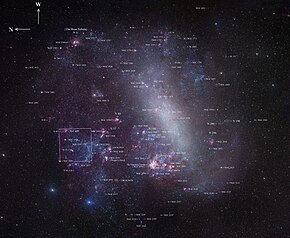| Large Magellanic Cloud | |
|---|---|
 A map of the Large Magellanic Cloud with the brightest features annotated | |
| Observation data (J2000 epoch) | |
| Constellation | Dorado/Mensa |
| Right ascension | 05h 23m 34s[1] |
| Declination | −69° 45.4′[1] |
| Distance | 163,000 light-years (49.97 kpc)[2] |
| Apparent magnitude (V) | 0.13[1] |
| Characteristics | |
| Type | SB(s)m[1] |
| Mass | 1×1010 (excluding dark matter), 1.38×1011[3] (including dark matter). M☉ |
| Number of stars | 20 billion[5] |
| Size | 9.86 kpc (32,200 ly)[1] (diameter; 25.0 mag/arcsec2 B-band isophote)[4] |
| Apparent size (V) | 10.75° × 9.17°[1] |
| Other designations | |
| LMC, ESO 56- G 115, PGC 17223,[1] Nubecula Major[6] | |
The Large Magellanic Cloud (LMC) is a dwarf galaxy and satellite galaxy of the Milky Way.[7] At a distance of around 50 kiloparsecs (163,000 light-years),[2][8][9][10] the LMC is the second- or third-closest galaxy to the Milky Way, after the Sagittarius Dwarf Spheroidal (c. 16 kiloparsecs (52,000 light-years) away) and the possible dwarf irregular galaxy called the Canis Major Overdensity. Based on the D25 isophote at the B-band (445 nm wavelength of light), the Large Magellanic Cloud is about 9.86 kiloparsecs (32,200 light-years) across.[1][4] It is roughly one-hundredth the mass of the Milky Way[11] and is the fourth-largest galaxy in the Local Group, after the Andromeda Galaxy (M31), the Milky Way, and the Triangulum Galaxy (M33).
The LMC is classified as a Magellanic spiral.[12] It contains a stellar bar that is geometrically off-center, suggesting that it was once a barred dwarf spiral galaxy before its spiral arms were disrupted, likely by tidal interactions from the nearby Small Magellanic Cloud (SMC) and the Milky Way's gravity.[13] The LMC is predicted to merge with the Milky Way in approximately 2.4 billion years.[14]
With a declination of about −70°, the LMC is visible as a faint "cloud" from the southern hemisphere of the Earth and from as far north as 20° N. It straddles the constellations Dorado and Mensa and has an apparent length of about 10° to the naked eye, 20 times the Moon's diameter, from dark sites away from light pollution.[15]
- ^ a b c d e f g h "NASA/IPAC Extragalactic Database". Results for Large Magellanic Cloud. Retrieved 29 July 2022.
- ^ a b Pietrzyński, G.; Graczyk, D.; Gieren, W.; et al. (March 2013). "An eclipsing-binary distance to the Large Magellanic Cloud accurate to two per cent". Nature. 495 (7439): 76–79. arXiv:1303.2063. Bibcode:2013Natur.495...76P. doi:10.1038/nature11878. ISSN 0028-0836. PMID 23467166. S2CID 4417699.
- ^ Erkal, Denis (2019). "The total mass of the Large Magellanic Cloud from its perturbation on the Orphan stream". Monthly Notices of the Royal Astronomical Society: Letters. 487 (2): 2685–2700. arXiv:1812.08192. doi:10.1093/mnras/stz1371.
- ^ a b De Vaucouleurs, Gerard; De Vaucouleurs, Antoinette; Corwin, Herold G.; Buta, Ronald J.; Paturel, Georges; Fouque, Pascal (1991). Third Reference Catalogue of Bright Galaxies. Bibcode:1991rc3..book.....D.
- ^ Dick, Steven J. (2019). Classifying the Cosmos: How We Can Make Sense of the Celestial Landscape. Astronomers' Universe (1st ed.). Cham: Springer International Publishing. ISBN 978-3-030-10380-4.
- ^ Buscombe, William (1954). "The Magellanic Clouds". Astronomical Society of the Pacific Leaflets. 7 (302): 9. Bibcode:1954ASPL....7....9B. ISSN 0004-6272.
- ^ Shattow, Genevieve; Loeb, Abraham (2009). "Implications of recent measurements of the Milky Way rotation for the orbit of the Large Magellanic Cloud". Monthly Notices of the Royal Astronomical Society: Letters. 392 (1): L21–L25. arXiv:0808.0104. Bibcode:2009MNRAS.392L..21S. doi:10.1111/j.1745-3933.2008.00573.x. S2CID 854729.
- ^ Cite error: The named reference
Macrietal2006was invoked but never defined (see the help page). - ^ Freedman, Wendy L.; Madore, Barry F. (2010). "The Hubble Constant". Annual Review of Astronomy and Astrophysics. 48: 673–710. arXiv:1004.1856. Bibcode:2010ARA&A..48..673F. doi:10.1146/annurev-astro-082708-101829. S2CID 119263173.
- ^ Majaess, Daniel J.; Turner, David G.; Lane, David J.; Henden, Arne; Krajci, Tom (2010). "Anchoring the Universal Distance Scale via a Wesenheit Template". Journal of the American Association of Variable Star Observers. 39 (1): 122. arXiv:1007.2300. Bibcode:2011JAVSO..39..122M.
- ^ "Magellanic Cloud". Encyclopædia Britannica. 2009. Retrieved 2009-08-30.
- ^ Ryden, Barbara; Peterson, Bradley M. (2009). Foundations of Astrophysics. New York: Pearson Addison-Wesley. p. 471. ISBN 9780321595584.
- ^ Besla, Gurtina; Martínez-Delgado, David; Marel, Roeland P. van der; Beletsky, Yuri; Seibert, Mark; Schlafly, Edward F.; Grebel, Eva K.; Neyer, Fabian (2016). "Low Surface Brightness Imaging of the Magellanic System: Imprints of Tidal Interactions between the Clouds in the Stellar Periphery". The Astrophysical Journal. 825 (1): 20. arXiv:1602.04222. Bibcode:2016ApJ...825...20B. doi:10.3847/0004-637X/825/1/20. ISSN 0004-637X. S2CID 118462693.
- ^ McAlpine, Stuart; Frenk, Carlos S.; Deason, Alis J.; Cautun, Marius (2019-02-21). "The aftermath of the Great Collision between our Galaxy and the Large Magellanic Cloud". Monthly Notices of the Royal Astronomical Society. 483 (2): 2185–2196. arXiv:1809.09116. Bibcode:2019MNRAS.483.2185C. doi:10.1093/mnras/sty3084. ISSN 0035-8711.
- ^ Sessions, Larry (December 8, 2021). "The Magellanic Clouds, our galactic neighbors". EarthSky. Retrieved 2013-07-17.